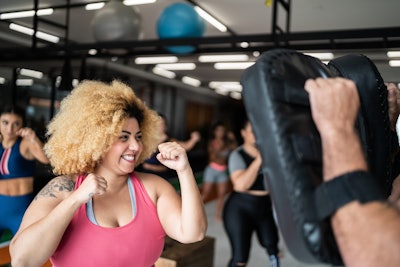
America’s trucking industry is consumed by an ever-expanding chasm that is the driver shortage.
The industry is exploring everything from the many technologies available that could improve efficiencies and increase driver uptimes to driverless vehicles. It’s also working to lower the legal interstate driver age from 21 to 18, but to-date the industry has managed to evade a significant portion of the population: women. As of 2020, women made up only 7.8% of the U.S.’s professional truck driver workforce, according to the American Trucking Association.
Statistically, one of the top reasons women don’t consider truck driving as a career is safety.
Nearly 18% of respondents in a Women in Trucking Association survey think trucking is not a safe industry for women, with 87% saying they feel truck stops are unsafe for women and 85.5% saying rest areas are unsafe. Approximately 75% say the cab is a location with significant safety threats.
According to data from the Insurance Institute for Highway Safety, women tend to be more focused on safety than men. But that data is referring to driving safely, which by the way is a great reason to hire women. But when considering a career as a professional driver, women have a greater fear than being involved in or killed in an accident.
I remember the first time my mother had a conversation with me about sexual violence. I was 6.
From a young age, women are taught how to avoid violence – sexual or otherwise – at the hands of men. If I’m walking along a sidewalk at night after grabbing dinner with friends, I’m constantly observing what’s around me; I’m holding my keys between my fingers, and I have my finger at the ready to press the lock button on my phone five times to call emergency services (five is too many if you’re in an emergency situation, by the way) until I’m safely in my car, which I don’t get in until I’ve checked the back seat.
And that’s only on the sporadic occasion that I’m out at night. Can you imagine being a woman out on the open road having to be constantly on alert? That’s stressful.
According to the National Sexual Violence Resource Center, one in five women in the U.S. experienced completed or attempted rape during their lifetime, and 81% of women reported experiencing some form of sexual harassment and/or assault in their lifetime.
And then you hear horror stories like when 53-year-old truck driver Christine Summers was beaten to death by a random man on the side of I-59/20 in Alabama after pulling to the shoulder because she saw something in the road.
My mother, a former truck driver who keeps in touch with friends who’ve remained in the industry, recently told me another scary story. One of her friends was driving when she saw a man holding a weapon in the car beside her. The man noticed her looking at him, and when she sped up, he stayed beside her. When she slowed down, he stayed beside her. She was finally able to shake him, but she was shaken.
So what are trucking companies supposed to do to make women feel safer on the road? Allow them to carry their own guns?
My grandfather always carried a small pistol with him on the road. While there’s no federal law that prohibits drivers from packing heat as long as they observe local and state laws, many trucking companies don’t allow their drivers to carry.
I’m sure there are plenty of good reasons for that (like insurance liabilities, etc). I own a gun myself, and I am trained to use it, but it is far more dangerous for someone to walk around with a gun and not know how to use it, especially a woman who could easily be overpowered by a man and have her own weapon used against her.
Maybe trucking companies could consider allowing drivers to carry if they participate in certified training courses – and potentially even a mental evaluation and clearance – but of course there are gray areas there, too. Not to mention having to remember all the carrying laws for each state, which more often than not would simply result in a lack of following them, and keeping track of which states' permits are valid in other states.
No. A better option would be mandatory self-defense classes – maybe even ongoing rather than a one-time deal – provided by the company.
A University of Oregon sociologist found that women who took 10-week self-defense training were significantly less likely to experience unwanted sexual contact than those who didn't.
According to the Women in Trucking Association survey, approximately 25.5% of respondents have had some formal training in self defense, but the organization noted that the industry needs to work harder toward making safety training for women drivers a priority, and I agree.
Not only is self-defense training far less costly for a company than if an accident with a gun were to occur, it’s also extremely effective and has additional benefits outside of protection – like improved confidence and better health.
Self-defense is also a better option because many – not just women – fear guns, and no one who fears a gun should hold one. That’s a recipe for disaster. Learning how to use your body to protect yourself is far more empowering.












